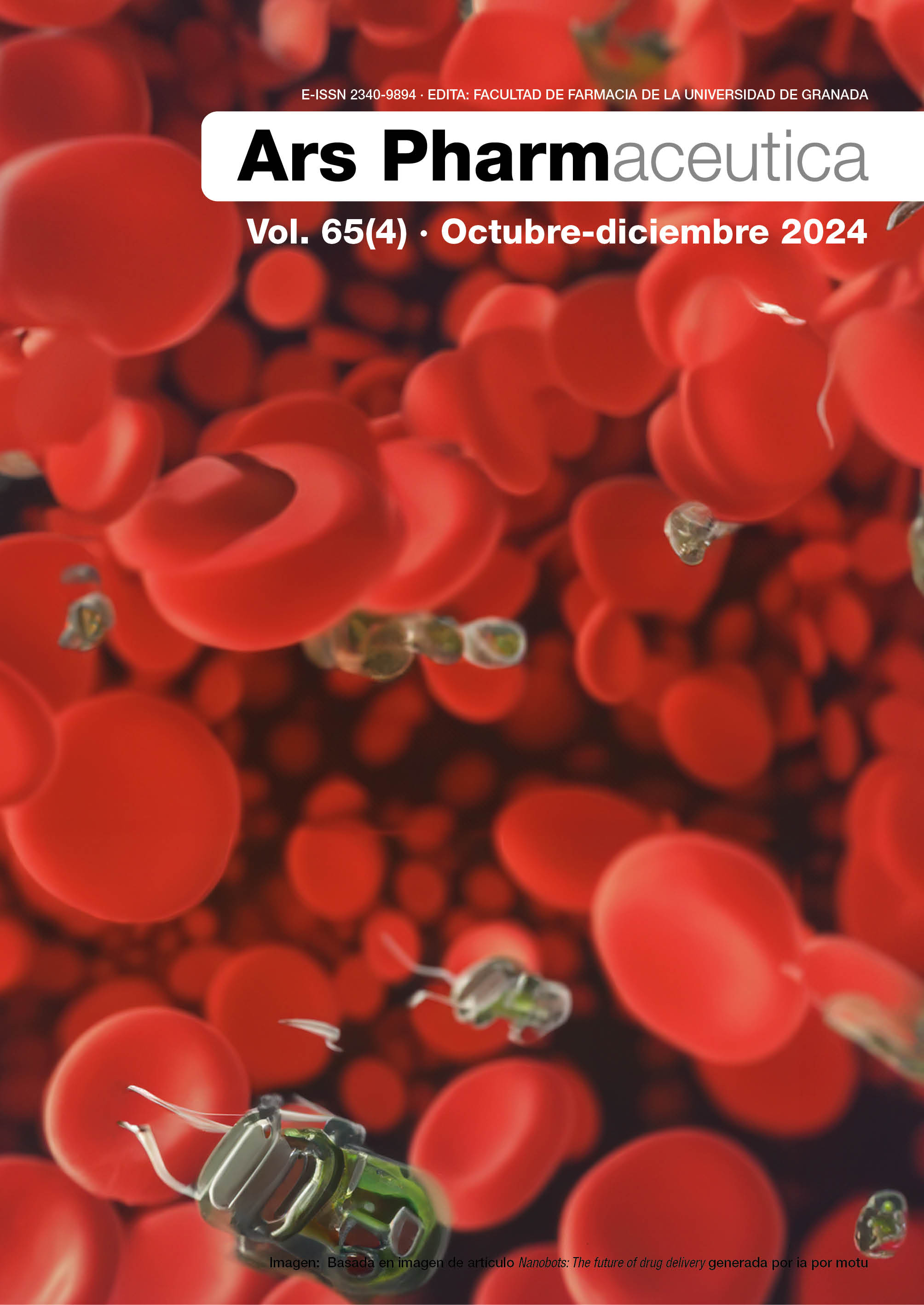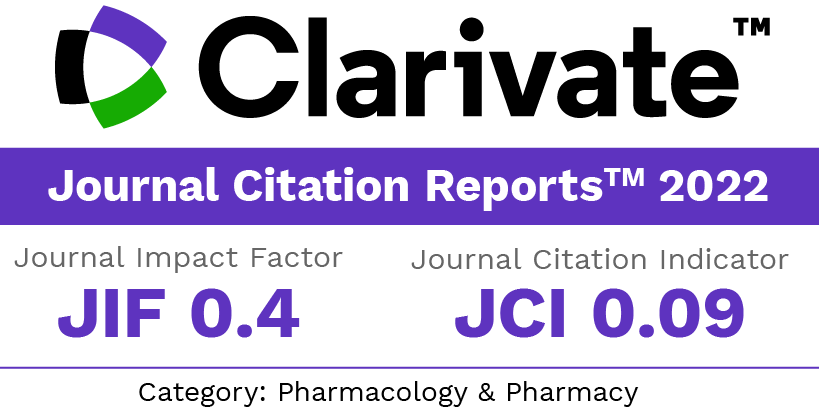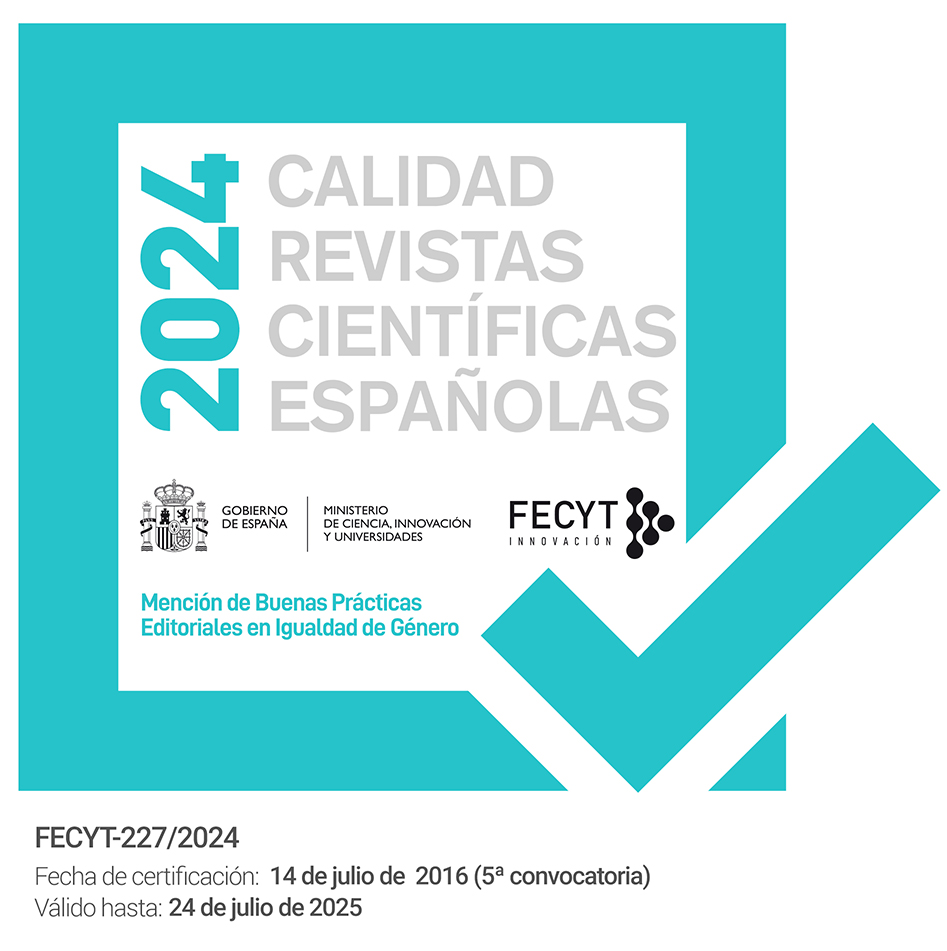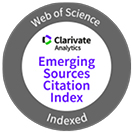Conocimiento sobre el proceso de uso de medicamentos antihipertensivos y su relación con la adherencia
DOI:
https://doi.org/10.30827/ars.v65i4.29993Palabras clave:
Adherencia, Conocimiento de la Medicación por el Paciente, Conocimiento del uso, Cumplimiento Terapéutico, Medicamentos antihipertensivosResumen
Introducción: La adherencia a la medicación antihipertensiva (Adh-MHTA) se ve influida por el conocimiento del paciente sobre la hipertensión arterial (HTA) y los medicamentos prescritos para tratarla. Pocos estudios han evaluado cómo influye el conocimiento del paciente sobre el proceso de uso de los medicamentos antihipertensivos (CUMA) en la Adh-MHTA. El objetivo fue evaluar la relación entre el CUMA y la Adh-MHTA, y la propuesta de un cuestionario para medir el CUMA (CUMA-Q).
Método: Se realizó un estudio observacional descriptivo transversal en 95 pacientes que acudían a retirar su medicación antihipertensiva (MHTA) a 5 farmacias comunitarias del área metropolitana de Granada (España). Se calculó el porcentaje de adherencia a los MHTA (%Adh-MHTA) en base al registro de dispensación del sistema prescripción electrónica (SPE) del Sistema Andaluz de Salud (SAS). Se realizó una regresión logística multivariante para estudiar la relación entre el CUMA y la Adh-HTA. Se estudió la validez y fiabilidad de CUMA-Q.
Resultados: Se incluyeron 95 pacientes (56,8 % mujeres). La edad media fue 68,1 (DE: 10,0) años. Sólo el 17,9 % tenían un IMC<25kg/m2. Considerando un %Adh-HMTA mínimo del 80 %, el 30,5 % no fue adherente. El análisis multivariante que existía mayor riesgo de ser no adherente si no se conoce el proceso de uso del medicamento de forma estadísticamente significativa.
Conclusiones: Este estudio pone de manifiesto que, si el paciente sabe identificar sus MHTA y conoce la dosis y pautas prescritas, es más probable que su adherencia a dicha medicación sea adecuada. El CUMA-Q presentó propiedades psicométricas aceptables en la muestra estudiada.
Descargas
Citas
Williams B, Mancia G, Spiering W, Agabiti Rosei E, Azizi M, Burnier M, et al. 2018 ESC/ESH Guidelines for the management of arterial hypertension. Eur Heart J. 2018; 39(33):3021-3104. DOI: 10.1093/eurheartj/ehy339 DOI: https://doi.org/10.1093/eurheartj/ehy339
Carey RM, Muntner P, Bosworth HB, Whelton PK. Prevention and Control of Hypertension: JACC Health Promotion Series. J Am Coll Cardiol. 2018; 72(11):1278-1293. DOI: 10.1016/j.jacc.2018.07.008 DOI: https://doi.org/10.1016/j.jacc.2018.07.008
Worldwide trends in hypertension prevalence and progress in treatment and control from 1990 to 2019: a pooled analysis of 1201 population-representative studies with 104 million participants. Lancet 2021; 398:957–980. DOI: 10.1016/S0140-6736(21)01330-1 DOI: https://doi.org/10.1016/S0140-6736(21)01330-1
Menéndez E, Delgado E, Fernández-Vega F, Prieto MA, Bordiú E, Calle A, et al. Prevalence, Diagnosis, Treatment, and Control of Hypertension in Spain. Results of the Di@bet.es Study. Rev Espanola Cardiol Engl Ed. 2016; 69(6):572-578. DOI: 10.1016/j.rec.2015.11.034 DOI: https://doi.org/10.1016/j.rec.2015.11.034
Kingston A, Comas-Herrera A, Jagger C, MODEM project Forecasting the care needs of the older population in England over the next 20 years: estimates from the population ageing and care simulation (PACSim) modelling study. Lancet Public Health 2018; 3:e447–55. DOI: 10.1016/S2468-2667(18)30118-X DOI: https://doi.org/10.1016/S2468-2667(18)30118-X
Whitworth JA, World Health Organization, International Society of Hypertension Writing Group. 2003 World Health Organization (WHO)/International Society of Hypertension (ISH) statement on management of hypertension. J Hypertens. 2003; 21(11):1983-1992. DOI: 10.1097/00004872-200311000-00002 DOI: https://doi.org/10.1097/00004872-200311000-00002
Baena-Díez JM, Gómez-Fernández C, Vilató-García M, Vásquez-Lazo EJ, Byram AO, Vidal-Solsona M. [A prescription register incorporated into computerized medical records for patients with hypertension: a new instrument to evaluate medication adherence]. Aten Primaria. 2011; 43(7):336-342. DOI: 10.1016/j.aprim.2010.04.018 DOI: https://doi.org/10.1016/j.aprim.2010.04.018
Poulter NR, Borghi C, Parati G, Pathak A, Toli D, Williams B, et al. Medication adherence in hypertension. J Hypertens. 2020; 38(4):579-587. DOI: 10.1097/HJH.0000000000002294 DOI: https://doi.org/10.1097/HJH.0000000000002294
Buitrago F. Therapeutic adherence. How difficult it is to comply!. Atencion Primaria Soc Esp Med Fam Comunitaria. 2011; 43(7):343-344. DOI: 10.1016/j.aprim.2011.05.002 DOI: https://doi.org/10.1016/j.aprim.2011.05.002
Gadkari AS, McHorney CA. Unintentional non-adherence to chronic prescription medications: how unintentional is it really? BMC Health Serv Res. 2012; 12:98. DOI: 10.1186/1472-6963-12-98 DOI: https://doi.org/10.1186/1472-6963-12-98
AlGhurair SA, Hughes CA, Simpson SH, Guirguis LM. A systematic review of patient self-reported barriers of adherence to antihypertensive medications using the world health organization multidimensional adherence model. J Clin Hypertens Greenwich Conn. 2012; 14(12):877-886. DOI: 10.1111/j.1751-7176.2012.00699.x DOI: https://doi.org/10.1111/j.1751-7176.2012.00699.x
Paczkowska A, Hoffmann K, Kus K, Kopciuch D, Zaprutko T, Ratajczak P, et al. Impact of patient knowledge on hypertension treatment adherence and efficacy: A single-centre study in Poland. Int J Med Sci. 2021; 18(3):852-60. DOI: 10.7150/ijms.48139 DOI: https://doi.org/10.7150/ijms.48139
Mårdby AC, Akerlind I, Jörgensen T. Beliefs about medicines and self-reported adherence among pharmacy clients. Patient Educ Couns. 2007; 69(1-3):158-164. DOI: 10.1016/j.pec.2007.08.011 DOI: https://doi.org/10.1016/j.pec.2007.08.011
Jankowska-Polanska B, Uchmanowicz I, Chudiak A, Dudek K, Morisky DE, Szymanska-Chabowska A. Psychometric properties of the Polish version of the eight-item Morisky Medication Adherence Scale in hypertensive adults. Patient Prefer Adherence. 2016; 10: 1759-1766. DOI: 10.2147/PPA.S101904 DOI: https://doi.org/10.2147/PPA.S101904
Ghembaza MA, Senoussaoui Y, Tani M, Meguenni K. Impact of Patient Knowledge of Hypertension Complications on Adherence to Antihypertensive Therapy. Curr Hypertens Rev. 2014; 10(1):41-8. DOI: 10.2174/157340211001141111160653 DOI: https://doi.org/10.2174/157340211001141111160653
Fanelli E, Ravetto Enri L, Pappaccogli M, Fasano C, Di Monaco S, Pignata I, et al. Knowledge on arterial hypertension in general population: Results from a community pharmacy screening program. Nutr Metab Cardiovasc Dis. 2021; 31(4):1081-1086. DOI: 10.1016/j.numecd.2021.01.004 DOI: https://doi.org/10.1016/j.numecd.2021.01.004
Zheng F, Ding S, Luo A, Zhong Z, Duan Y, Shen Z. Medication literacy status of outpatients in ambulatory care settings in Changsha, China. J Int Med Res. 2017; 45(1):303-309. DOI: 10.1177/0300060516676726 DOI: https://doi.org/10.1177/0300060516676726
Zhong Z, Zheng F, Guo Y, Luo A. Medication Literacy in a Cohort of Chinese Patients Discharged with Acute Coronary Syndrome. Int J Environ Res Public Health. 2016; 13(7):720. DOI: 10.3390/ijerph13070720 DOI: https://doi.org/10.3390/ijerph13070720
Cordina M, Hämeen-Anttila K, Lauri J, Tabone S, Enlund H. Health and medication literacy and the desire to participate in pharmacotherapy decision making - comparison of two countries. Res Soc Adm Pharm RSAP. 2018; 14(9):817-823. DOI: 10.1016/j.sapharm.2018.06.009 DOI: https://doi.org/10.1016/j.sapharm.2018.06.009
Gavrilova A, Bandere D, Rutkovska I, Šmits D, Mauriņa B, Poplavska E, et al. Knowledge about Disease, Medication Therapy, and Related Medication Adherence Levels among Patients with Hypertension. Med Kaunas Lith. 2019; 55(11). DOI: 10.3390/medicina55110715 DOI: https://doi.org/10.3390/medicina55110715
Karaeren H, Yokuşoğlu M, Uzun S, Baysan O, Köz C, Kara B, et al. The effect of the content of the knowledge on adherence to medication in hypertensive patients. Anadolu Kardiyol Derg AKD Anatol J Cardiol. 2009; 9(3):183-188. PMID: 19520651
Amado Guirado E, Pujol Ribera E, Pacheco Huergo V, Borras JM; ADIEHTA Group. Knowledge and adherence to antihypertensive therapy in primary care: results of a randomized trial. Gac Sanit. 2011; 25(1):62-7. DOI: 10.1016/j.gaceta.2010.09.015. DOI: https://doi.org/10.1016/j.gaceta.2010.09.015
Márquez-Contreras E, López García-Ramos L de, Martell-Claros N, Gil-Guillen VF, Márquez-Rivero S, Pérez-López E, et al. Validation of the electronic prescription as a method for measuring treatment adherence in hypertension. Patient Educ Couns. 2018; 101(9):1654-1660. DOI: 10.1016/j.pec.2018.04.009 DOI: https://doi.org/10.1016/j.pec.2018.04.009
Prieto-Merino D, Mulick A, Armstrong C, Hoult H, Fawcett S, Eliasson L et al. Estimating proportion of days covered (PDC) using real-world online medicine suppliers’ datasets. J Pharm Policy Pract. 2021;14(1):113. doi: 10.1186/s40545-021-00385-w. DOI: https://doi.org/10.1186/s40545-021-00385-w
Krousel-Wood M, Islam T, Webber LS, Re RN, Morisky DE, Muntner P. New medication adherence scale versus pharmacy fill rates in seniors with hypertension. Am J Manag Care. 2009; 15(1):59-66. PMCID: PMC2728593
Nunally, J.C., Bernstein, I.H. Psychometric Theory. United States of América: McGraw-Hill; 1994.
Ayodapo AO, Elegbede OT, Omosanya OE, Monsudi KF. Patient Education and Medication Adherence among Hypertensives in a Tertiary Hospital, South Western Nigeria. Ethiop J Health Sci. 2020; 30(2):243-250. DOI: 10.4314/ejhs.v30i2.12 DOI: https://doi.org/10.4314/ejhs.v30i2.12
Shi S, Shen Z, Duan Y, Ding S, Zhong Z. Association Between Medication Literacy and Medication Adherence Among Patients With Hypertension. Front Pharmacol. 2019; 10:822. DOI: 10.3389/fphar.2019.00822 DOI: https://doi.org/10.3389/fphar.2019.00822
Martínez González MA, Sánchez-Villegas A, Faulín Fajardo J. Bioestadística amigable. Madrid (España): Diaz de Santos; 2009. 936 p.
Publicado
Cómo citar
Número
Sección
Licencia
Derechos de autor 2024 Elisa Isabel Pareja Martínez, Elisabeth Esquivel-Prados, Fernando Martínez Martínez, Jose Pedro García-Corpas

Esta obra está bajo una licencia internacional Creative Commons Atribución-NoComercial-CompartirIgual 4.0.
Los artículos que se publican en esta revista están sujetos a los siguientes términos en relación a los derechos patrimoniales o de explotación:
- Los autores/as conservarán sus derechos de autor y garantizarán a la revista el derecho de primera publicación de su obra, la cual se distribuirá con una licencia Creative Commons BY-NC-SA 4.0 que permite a terceros reutilizar la obra siempre que se indique su autor, se cite la fuente original y no se haga un uso comercial de la misma.
- Los autores/as podrán adoptar otros acuerdos de licencia no exclusiva de distribución de la versión de la obra publicada (p. ej.: depositarla en un archivo telemático institucional o publicarla en un volumen monográfico) siempre que se indique la fuente original de su publicación.
- Se permite y recomienda a los autores/as difundir su obra a través de Internet (p. ej.: en repositorios institucionales o en su página web) antes y durante el proceso de envío, lo cual puede producir intercambios interesantes y aumentar las citas de la obra publicada. (Véase El efecto del acceso abierto).
























